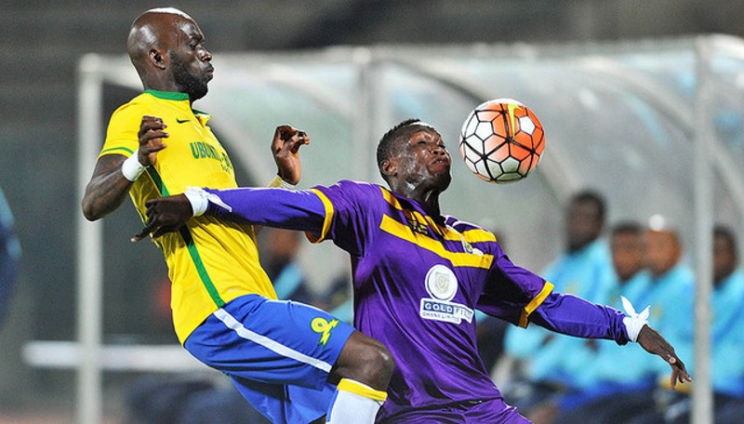The statement of Sulley Muntari’s agent, Sipho Shaven, struck a chord. Despite intensified expectations of a move to Hearts of Oak, Shaven revealed that his client had given him the green light to speak to South African clubs.
“He has given me the mandate to talk to clubs in South Africa. He is very keen to play in the Premier Soccer League (PSL) next season,” Shaven told KickOff.com.
“Remember, our league is well respected on the continent and a high-profile player will not turn down an opportunity to play in the PSL,” he added.
PSL is regarded as arguably, the most popular league on the continent. It is also seen as one with bigger financial backing.
The surprising fact here is that South Africa’s top-flight league was officially in business 40 years after the Ghana Premier League (GPL) started.
But, the gulf in development, the disparity in economic growth is incomprehensible.
One would have thought, Ghana, having dominated continental inter-club football in the late 90s and early 2000s, would have continued to be a powerhouse in all spheres of the game.
Two Ghanaian teams reached the CAF Champions League final between 1997 and 2002 with Hearts of Oak winning the 2002 edition. South Africa produced one finalist during that period (Mamelodi Sundowns in 2001).
Since then, two South African teams have made it to the final of the competition with Mamelodi Sundowns clinching the title in 2016. Ghanaian sides have in comparison struggled to make it past the group stages.
In the CAF Confederation Cup, Ghana produced two finalists in the maiden edition (2004). From then on, the country’s representatives have struggled and South Africa has produced two finalists.
However, the West African country has declined. When PSL gave the okay to clubs to start training in May with some social distancing rules in place, the GFA were grappling over what best the decision for their game was.
Heads of the country cannot be solely held liable for the indecision on the future of the league, but if the game which began 60 years ago had grown as expected with the right structures, a young product such as the PSL would not have found a solution whilst Ghana hunted for one.
PSL chairman Irvin Khoza announced in mid-June that, they were waiting for government’s approval to restart their suspended season. In Ghana, however, the league was cancelled at the end of June.
The decision was mainly attributed to COVID-19 and lack of finances.
South Africa has 238,339 coronavirus cases confirmed with nearly 113,061 recoveries and 3,720 reported dead cases as at July 9, 2020. The population of South Africa is estimated to be over 59 million, meaning that four out of a thousand people have tested positive for the disease.
The figures in South Africa cannot be compared to that of Ghana as they have a little over 22,822 recorded cases with 17,564 recoveries and 129 losing their lives on the same date. The West African country’s population is estimated to be over 31 million meaning just one out of a thousand have tested positive.
With this variance in cases of the two countries, it can then be concluded that, financial muscle became the deciding factor for Ghana.
Before the cancellation of the season, President of the Ghana FA, said their inability to resume the game is due to 'lack of money'.
Ghana football is well behind now. South Africa is a more attractive and financially sound league, capable of dealing with anomalies. What triggered the gap?
The World Cup factor
The PSL was formed in 1996 and began with 18 teams which was later reduced to 16. During its incubation period, their headline sponsor was Castle Lager (1996-2007).
In June 2004, a match fixing scandal was unearthed in South Africa, leading to the arrest of match commissioners, referees and club bosses. The revelation was damaging to the league’s reputation across the continent.
During that period, Ghana football was regarded as one of the best with Hearts of Oak and Asante Kotoko making the headlines in Africa. Ghana’s two biggest clubs clashed in the maiden 2004 Confederation Cup final which Hearts won after two legs.
South Africa, however, had a wildcard; the hosting rights of the prestigious 2010 World Cup. The government got straight into action with some improvements to a number of infrastructures. World class stadiums were built to suit the magnitude of the event.
According to the 2010 FIFA World Cup country report, the nation spent over $3 billion on preparations. $1.1 billion of it was used on building and upgrading stadiums (8) alone. $1.3 billion was dedicated to improving road, rail and airlines. A further $392 million was invested on the country's main ports of entry. FIFA also made a cash injection of $1.298 billion into the project.
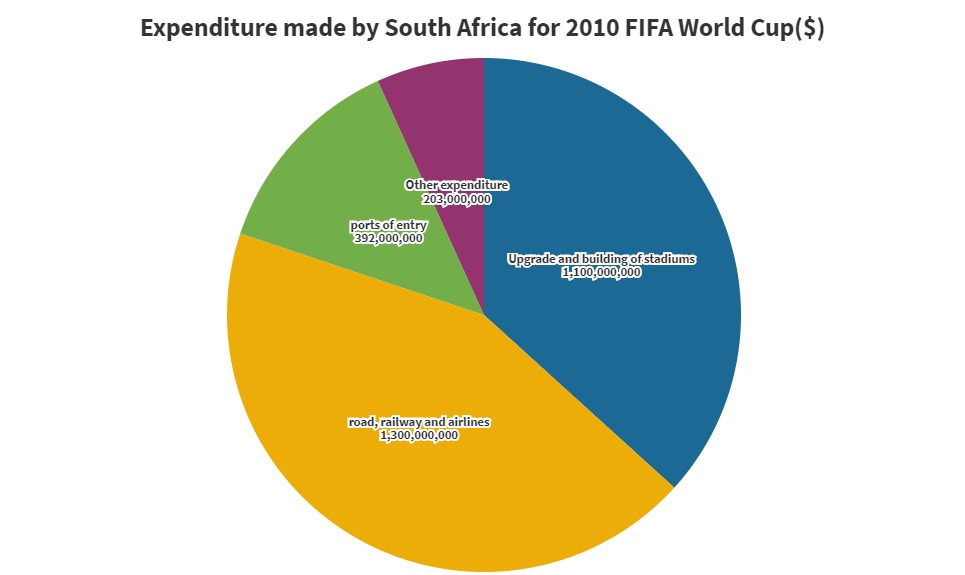
The country was criticized for such an outlay but the benefits were endless. Sponsorship for the league and its clubs rose exponentially and the country became a more enticing place for footballers across the globe.
Khama Billiat, Zimbabwe’s dribbing wizard and one of Africa’s best talents, has spent most of his career in South Africa. He currently features for Kaizer Chiefs, one of the most decorated teams in the country.
Richard Ofori, Ghana’s first choice goalkeeper, is spending his peak years with Maritzburg, another club based in South Africa.
"The World Cup in South Africa was a huge, huge financial success for Africa, for South Africa and for FIFA," FIFA president Sepp Blatter said in 2011 after the release of the report.
Ghana, after co-hosting the Africa Cup of Nations (AFCON) with Nigeria in 2000, were named sole hosts of the 2008 edition. The news brought the country into the spotlight and government reacted with a $157.2 million expenditure on the rehabilitation of four stadiums.
The tournament was also a success, albeit not on the scale of the 2010 World Cup.
Ten years after the World Cup, South Africa places 6th in the CAF five-year ranking whilst Ghana places 19th.
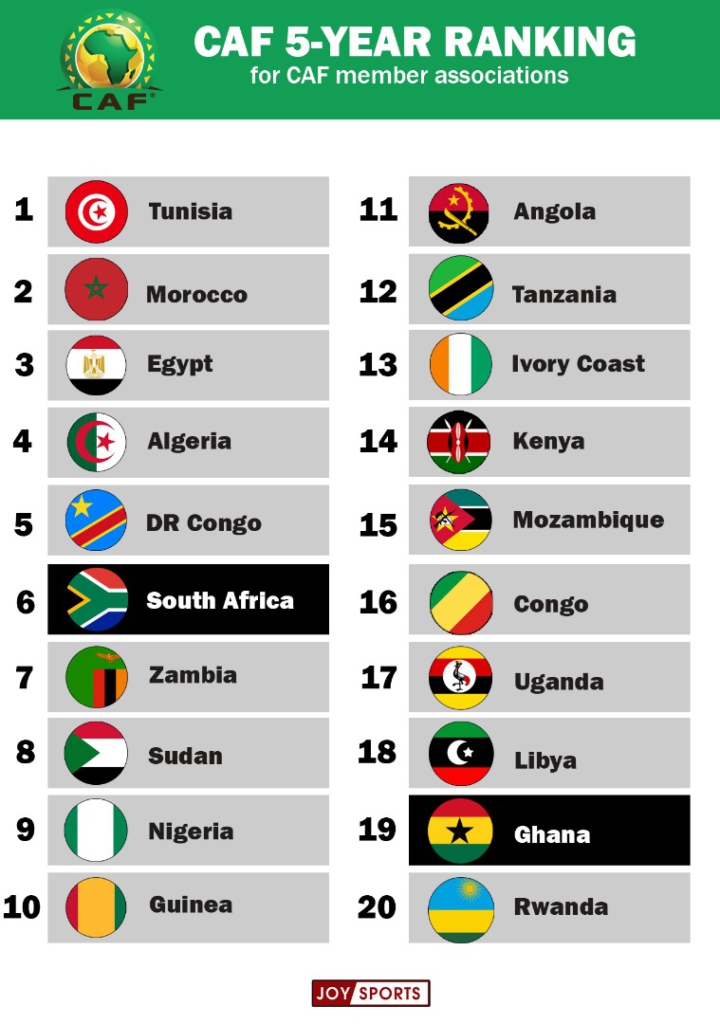
The CAF 5-Year Ranking is used by the Confederation of African Football (CAF) to determine the number of clubs that each CAF member association may enter in Africa's club football competitions, the CAF Champions League and the CAF Confederation Cup.
At present, those associations ranked in the top twelve may enter two sides into each of the two continental tournaments, while the remaining associations are limited to a single side in each competition.
South Africa has four slots in the continental competitions. Ghana, however, has two.
In next season’s projection, South Africa will maintain their position in the ranking and Ghana will drop to 20th.
Investments have reaped huge rewards for the PSL.
Headline sponsorship
In 2007, the South African top flight landed ABSA bank as a headline sponsor in a five-year R500 million deal ($70.9 million). The agreement was extended in 2012 using the same terms and was maintained in 2017. ABSA announced an increase in yearly payments to a reported R140 million ($9.7 million) for the 2019/20 season. This was due to a reported R40 million ($2.8 million) increase in prize money.
In 2020, ABSA’s marriage with PSL came to an end with the bank stating that the dire economic conditions in the country influenced the decision.
“We actually took account of the state of the economy. This is not a decision we took because of Covid-19. Before Covid-19 we (the country) were facing a downgrade, facing a recession, probably negative growth for a couple of quarters to come – so the outlook wasn’t very good,” ABSA head of communications, Songezo Zibi told Daily Maverick.
Irvin Khoza, the PSL chairman was unfazed by the development. He announced that multiple bids have already come in.
“We’ve got four companies at the moment (who want to sponsor the league),” Khoza said via IOL.
In November 2019, the PSL posted an astonishing R1.002 billion ($58.9 million) in revenue from the 2018/19 financial year, an increase in the R938 million ($55.2 million) in 2017/18 financial year‚ and R884 million ($52 million) in 2016/17. On the headline sponsor aspect, South Africa has done a fantastic job.
The story of Ghana’s biggest league is a different one. There have been four headline sponsors since 2007. OneTouch was the first with a GH¢1.7 million deal ($1.6 million 13 years ago) for the 2007/08 season. Globacom then took over with a five year deal worth $15 million in December 2008. The deal came to an end in 2013 with some controversies during the period.
First Capital Plus bank swooped in with a five-year $10 million deal in January 2014. The agreement lasted for just one year after the company agreed to undergo restructuring.
After going three years without a headline sponsor, Zylofon Cash looked to have provided a solution with reportedly the same terms as the First Capital deal but that was also cut short after the GFA premises was shut down, thanks to the revelations in the famous Anas expose.
During an investigation by the Normalization Committee, it was reported that the documents certifying GFA’s deal with Zylofon Cash could not be found.
These problems, coupled with the deplorable state of pitches and poor branding makes finding and maintaining headline sponsors a daunting task for the GFA.
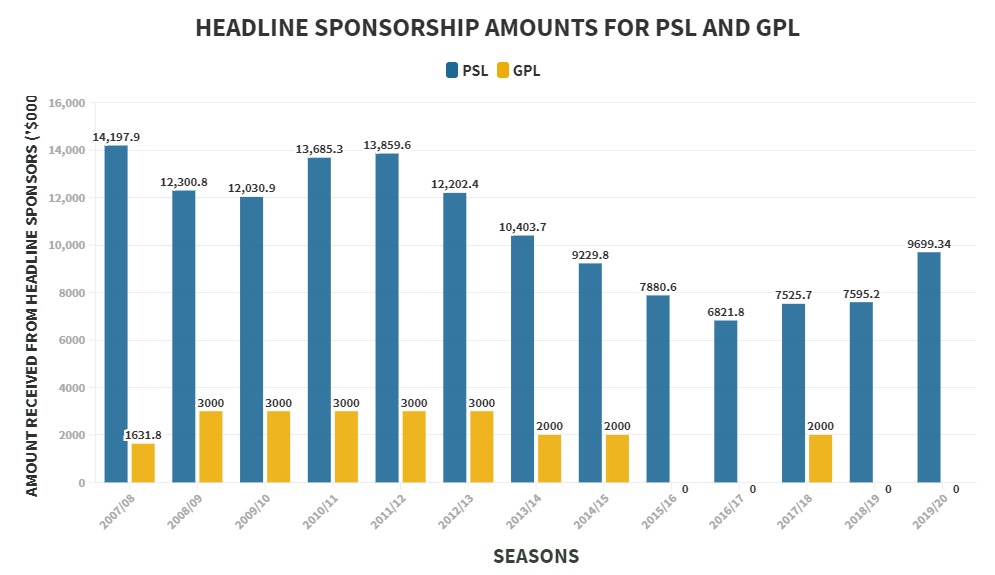
In the above graph, some adjustments were made which should be of note. The yearly amounts in the PSL was adjusted using the end of year rate relating to the first halves of the season.
Also, we are assuming that money agreed to in the GPL were paid by sponsors. The figures are not adjusted for inflation to meet the current year.
The gap is indeed an incredible one. In 13 years, South Africa has made a total of $137,433,040 from headline sponsorship whilst Ghana has made $22,631,800, a difference of $114,801,240.
TV Rights
PSL have enjoyed a long lasting relationship with SuperSport after signing their first deal in 2007. It was a five-year contract worth R1.6 billion ($200 million). After the first agreement ended in 2012, they signed another five-year R2 billion deal ($277.7 million) with the Pan-African group.
SuperSport managed to outbid competitors for another TV rights deal in 2017. The financial details of the deal were not specified.
GPL’s first known TV rights deal came in September 2013 with SuperSport. The agreement was worth $700,000 per year for three years. After its expiration, StarTimes signed a 10-year deal worth $17.95 million with the GFA. It lasted for only three years after a mutual termination was decided.
In January 2020, the Chinese media company returned with a five-year deal worth $1.05 million per year.
Due to these deals and others, PSL gained enough funds to give out monthly grants of R2.5 million ($147,000) to each club (16 in total) in the 2019/20 season.
The Ghanaian top-flight in comparison gave out $8605.85 (GH¢50,000) each to 18 teams only at the start of the campaign. The additional $30,000 each meant for clubs from the StarTimes package is yet to be fully given out.
Two key sponsors were kept by the South African top flight for over a decade whilst getting good deals. The Ghanaian top-flight have not enjoyed the same experience.
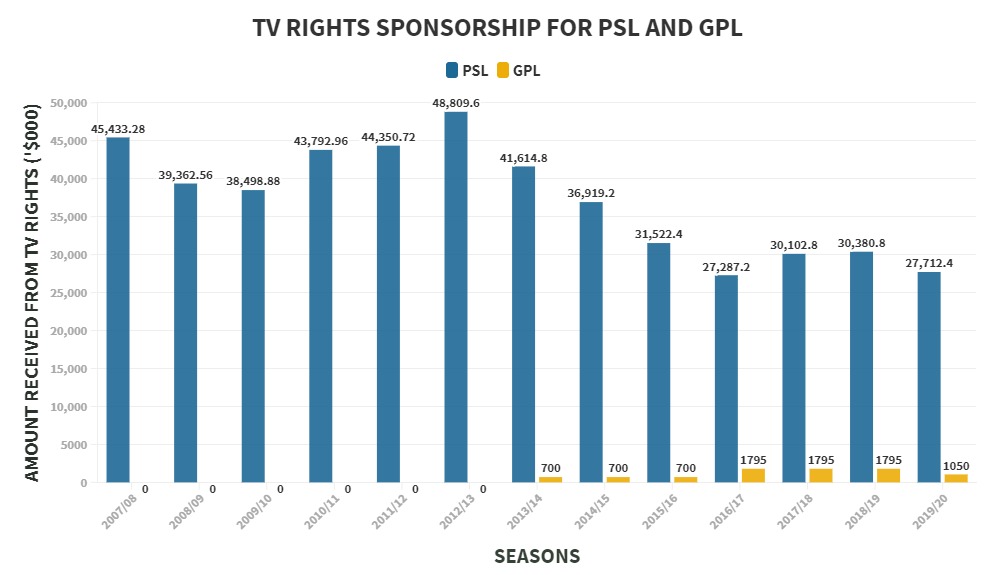
As with the previous graph, there are some things to note. The yearly amounts in the PSL was adjusted using the end of year rate relating to the first halves of the season.
The SuperSport deal for the final three seasons (2017/18-2019/20) were not stated so the previous deal (2 billion rand for five years signed in 2012) was maintained.
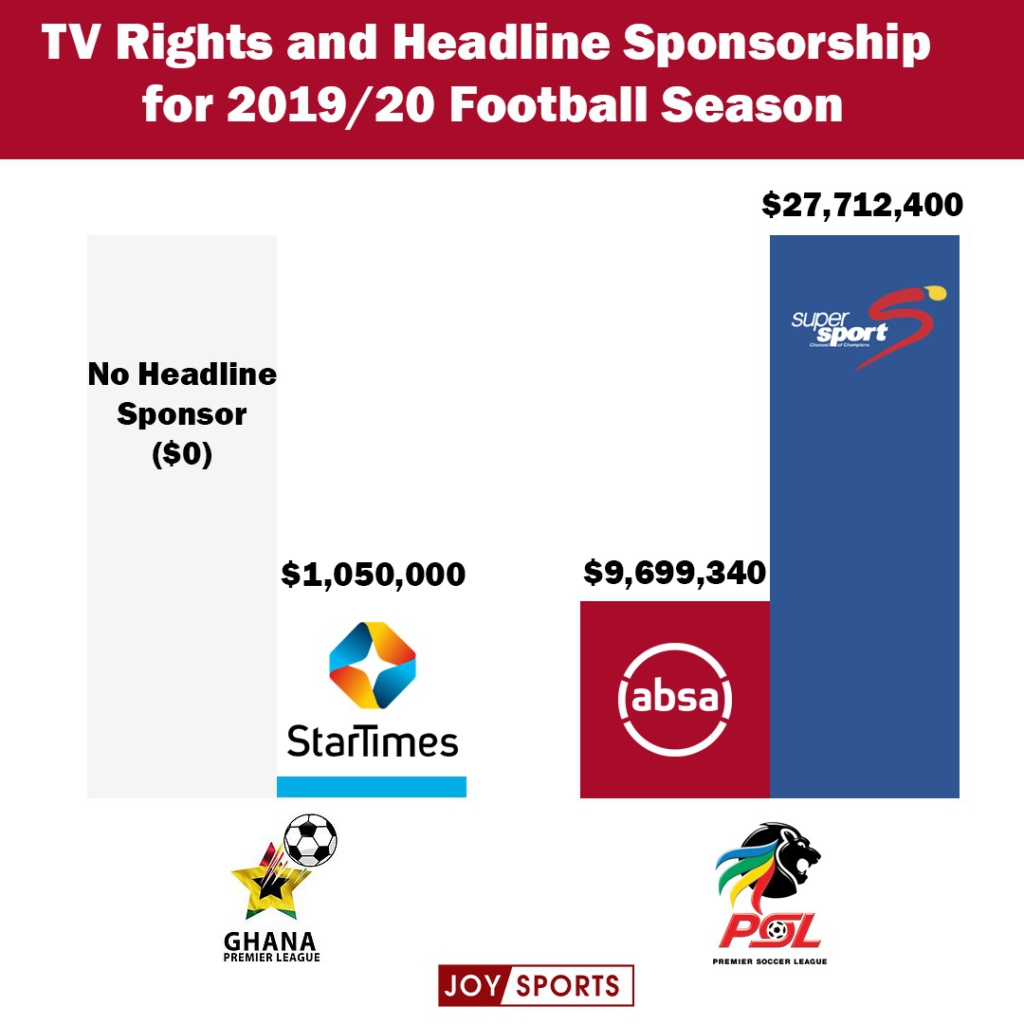
Also, we are assuming that money agreed to in the GPL were paid by sponsors despite multiple breaks in the league.
It can be seen that the difference is staggering considering the leeway given to the GPL. In a 13-year span, South Africa has made a whopping $485,787,600 from TV rights whilst Ghana made $8,535,000, a difference of $477,252,600.
What the future holds for GPL
The GFA has been exploring the possibility of going autonomous in the last few months. An autonomous committee has been formed for that purpose despite some calls against the idea.
The word ‘autonomous’ means having the freedom to govern oneself or control one’s own affairs. In the case of football, an autonomous league is described as one that is independent in terms of managing finances and controlling the direction of the league.
Ghana League Clubs Association president, Cudjoe Fianoo, noted that the idea had been floating around but the GFA were afraid that the league would be more powerful than the association.
''The idea of the Ghana Premier League to be autonomous started some years ago but has been fruitless. The autonomous issue has been there for a while now,'' Fianoo told Fox FM.
''The delay of the league going autonomous is because the previous administration feared the body to manage it will be more powerful than the GFA.”
''The league may be more attractive than matches of the National Teams which they do not want it that way. How many local players are in the Black Stars?'' he quizzed.
The PSL uses the autonomous model and have had huge success with it.
South African Premier League senior manager, Luxolo September, revealed how they made it work.
“Here in South Africa, all radio stations are about local football, local products, and local talents and we hope to share this lesson with Ghana and learn from Ghana as well,” he told Takoradi based Skyy Power 93.5 FM.
He however advised that Ghana should develop a different model, one that will suit the country’s specific needs.
“Ghana should decide what model is good for them, from the Commercial, Sponsorship, Product points of view.”
The job seems difficult considering the absence of a World Cup to fall on and the struggle to tie down key sponsors on long-term deals.
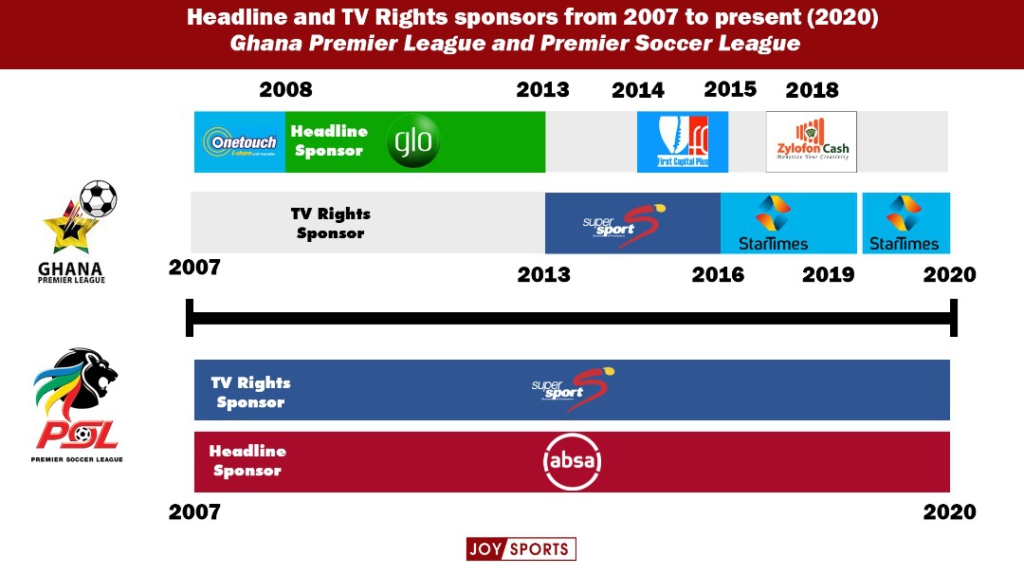
It has become quite clear in the last 13 years that the model of the two leagues are quite different and that has trickled down to the longevity and difference in sponsors they have. South Africa has needed just two main sponsors on headline and TV basis whilst Ghana has taken six.
The financial gap between the GPL and the PSL is over half a billion dollars, a figure which seems insurmountable but with proper execution and patience, Ghana football may reach the pinnacle of Africa once again.
Latest Stories
-
Ouattara slams Hearts fans over lack of support, urges loyalty to local clubs
2 minutes -
Minority slams government over poor handling of nurses’ strike
3 minutes -
EGL launches “Cedi Apicki Apicki” Promo to cushion consumers amid cedi appreciation
4 minutes -
Photos: Interesting images for funeral of late Mamponghene Daasebre Osei Bonsu II
6 minutes -
Bibiani GoldStars CEO confirms Frimpong Manso will stay after historic title win
17 minutes -
Ghana Internet Governance Forum 2025 promotes inclusive digital future
24 minutes -
Drivers with unapproved tinted windows to pay fine as DVLA begins full enforcement of new road worthy penalties
25 minutes -
Deploying retired nurses and midwives won’t solve ongoing strike – GRNMA General Secretary
36 minutes -
Sinapi Aba Mentorship Program hosts participants at regional network conference for sustainable business connections
38 minutes -
The illusion of control: The data we give and the control we lose
44 minutes -
Borders, boots and national pride: The World Cup as a mirror of global politics
45 minutes -
‘Our demands are not above the roof’ – Striking nurses and midwives
46 minutes -
KATH blood bank receives restocking through CCC Blook donation drive
51 minutes -
Parliament summons GUTA, Spare parts dealers, AGI, others over refusal to reduce prices despite cedi appreciation
58 minutes -
Access Bank wins Global Finance’s ‘Best Bank’ Honours for second consecutive year
1 hour

